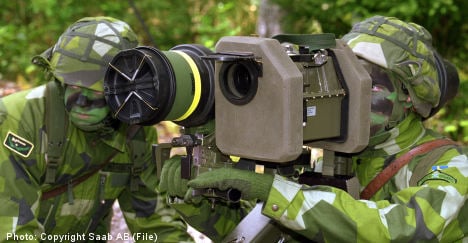“Despite the continuing global economic recession in 2009, the total arms sales of…100 of the world’s largest arms-producing companies increased by $14.8 billion from 2008,” the Stockholm International Peace Research Institute (SIPRI) said in a statement upon releasing the report.
That amounts to a year-on-year increase of 8 percent, and “an increase of a total of 59 percent in real terms since 2002”, SIPRI said, pointing out that 61.5 percent of all 2009 arms sales made by the top 100 arms dealers could be attributed to 45 companies based in the US.
“US government spending on military goods and services is a key factor in arms sales increases for US arms-producing and military services companies and for Western European companies with a foothold in the US arms and military services market,” SIPRI arms industry expert Susan Jackson explained in the statement.
On SIPRI’s list of the world’s 10 largest arms vendors, seven were American: Lockheed Martin, Boeing, Northrop Grumman, General Dynamics, Raytheon, L-3 Communications and United Technologies.
In 2009, Lockheed Martin inched ahead of the UK’s BAE Systems to take global first place, raking in $33.4 billion on arms sales compared to BAE’s $33.3 billion. Meanwhile, both companies each accounted for 8.3 percent of all weapons sold by the world’s top 100 vendors.
BAE’s branch in the US alone accounted for $19.3 billion in sales, which if it had been a separate company would have secured it a seventh place on the global ranking, SIPRI said.
Thirty-three of the top 100 companies were based in nine western European countries: Finland, France, Germany, Italy, Norway, Spain, Sweden, Switzerland and Britain, accounting for $120 billion dollars worth of sales, or 30 percent of all weapons sold in 2009, according to SIPRI.
After BAE, the world’s second-largest vendor, trans-European group EADS, topped the ranking for the continent, securing a seventh place with $15.9 billion in sales, or 4 percent of the global market, and Italian Finmeccanica, which ranked eighth globally, with $13.3 billion in sales and 3.3 percent of worldwide sales.
Ten of the companies figuring on the top 100 list were based in Asia, including four in Japan and three in India, while seven were located in the Middle East, three of which were based in Israel.
Together, companies in these two regions generated $24 billion in arms sales, or 6 percent of the global market, SIPRI said. However, these numbers do not include China.
“Although it is known that several Chinese arms-producing enterprises are large enough to rank among the SIPRI Top 100, a lack of comparable and sufficiently accurate data makes it impossible to include them,” Jackson explained to AFP.
SIPRI defines arms sales as “sales of military goods and services to military customers, including both sales for domestic procurement and sales for export.”
The think tank, which specialises in research on conflicts, weapons, arms control and disarmament, was created in 1966 and is 50 percent financed by the Swedish state.



 Please whitelist us to continue reading.
Please whitelist us to continue reading.
Member comments